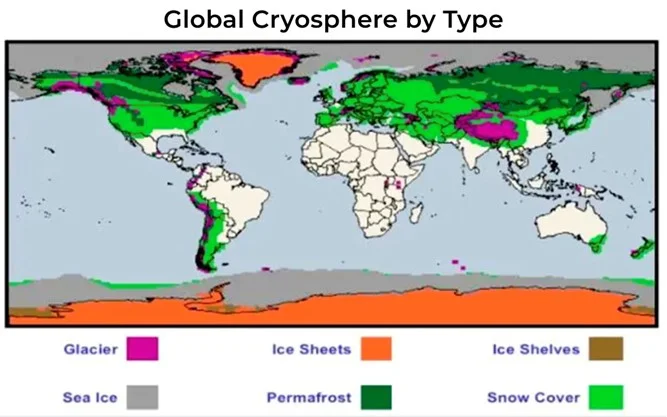Answer:
| Approach:
Introduction
- Brief definition of the term Cryosphere.
Body
- Describe the term further and mention lined to the global climate
Conclusion
- Conclude your answer with the significance of the Cryosphere.
|
Introduction:
The cryosphere, which comprises the frozen water on the Earth’s surface, plays a crucial role in regulating the planet’s climate. The impact of the cryosphere on global climate is significant and far-reaching, affecting everything from ocean currents to precipitation patterns.
Body:
Impact of Cryosphere on Global Climate:
- Albedo: The cryosphere has a high albedo, which means it reflects a significant amount of the sun’s energy [80-90%] back into space. This reflected energy helps to cool the Earth’s surface and atmosphere, and it plays a critical role in regulating the Earth’s temperature. Like In 2019, Greenland experienced its largest-ever ice melt, resulting in a significant decrease in its albedo.
- Sea level rise: As glaciers and ice sheets melt, they contribute to sea level rise, which can have far-reaching impacts on global climate patterns. Sea level rise can alter ocean currents, change precipitation patterns, and impact coastal ecosystems and communities. Like The small island nation of Kiribati in the Pacific Ocean is particularly vulnerable to sea level rise.

- Permafrost thawing: Permafrost is frozen soil that covers nearly a quarter of the land in the Northern Hemisphere. As permafrost thaws, it releases large amounts of methane and carbon dioxide into the atmosphere, which can contribute to the warming of the planet. Like In Alaska, the thawing of permafrost has caused infrastructure damage and forced some communities to relocate.
- Ocean circulation: The melting of sea ice in the Arctic Ocean can alter ocean circulation patterns, which can impact global climate. Changes in ocean circulation can affect the distribution of heat and nutrients, which can impact weather patterns around the world. Like changes in the North Atlantic circulation pattern can impact the Gulf Stream, which brings warm water and mild temperatures to Europe.
Conclusion:
Changes to the cryosphere can have significant implications for the planet’s climate, ecosystems, and communities. Understanding the role of the cryosphere in global climate is essential for mitigating the impacts of climate change and developing strategies for adaptation and resilience.
